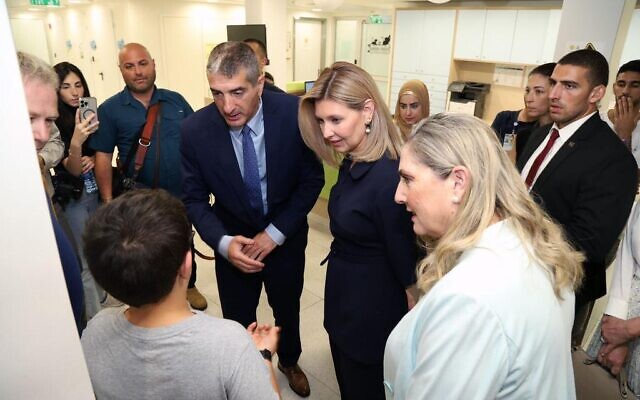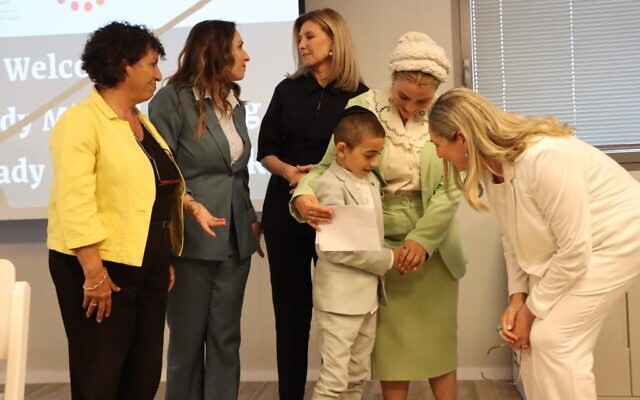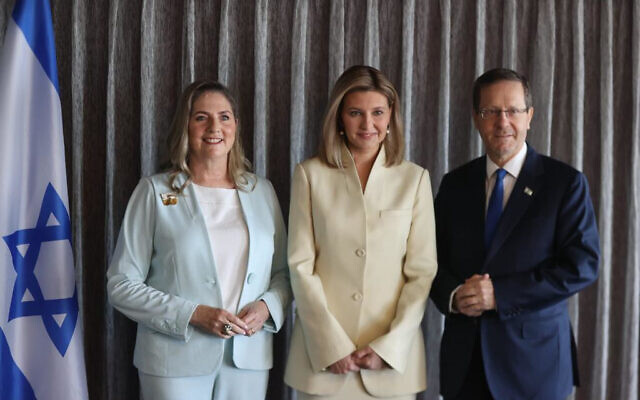‘We cannot cope alone’: Ukraine’s first lady hopes for medical ties with Israel
Accompanied by Michal Herzog, Olena Zelenska tours Sheba Medical Center, then holds meeting with childhood trauma experts: ‘Unfortunately, you have rich experience in this area’

Ukraine’s First Lady Olena Zelenska, together with her Israeli counterpart, Michal Herzog, met with a range of medical and psychological experts in Israel on Monday as part of Zelenska’s ongoing tour of Israel.
Zelenska, the wife of Ukrainian President Volodymyr Zelensky, has been traveling the world and meeting world leaders to draw humanitarian support for the country since the beginning of the Russian invasion in early 2022. Israel has sent repeated waves of humanitarian and medical aid to Ukraine, but has been criticized by Kyiv for not sending asked-for military assistance.
The Ukrainian first lady began her day visiting Sheba Medical Hospital, where she expressed hope for future cooperation between Ukrainian and Israeli medical experts.
“We need programs that support mental health and assist in the rehabilitation of injured citizens, including children, adults and the elderly. Our healthcare system cannot cope alone,” she said.
Herzog and Zelenska toured the Mordechai Shani Rehabilitation and Integrative Medicine Center at Sheba, where they met Uri Zehavi, a 25-year-old who became paralyzed as a result of a severe injury. They also visited the “Virtual Reality” department and met Nurit Cohen Abrahamson, who has been undergoing treatment for several months following a blood vessel blockage in both legs, and later met 11-year-old Jonathan, who has been treated for the past month in Sheba’s children’s hospital.
“We are very pleased that you came here to see for yourself the special treatment for children,” Herzog told Zelenska. “Israel is very proud, and we want to share our knowledge, infrastructure, and excellent medical facilities with those in need around the world.”

The Ukrainian first lady then met with officials from the Israel Trauma Coalition, as well as NATAL, the Israel Trauma and Resiliency Center, to discuss treating children with trauma from conflicts. The meeting included a discussion with a mother from Sderot about the effects of constant rocket fire from Gaza on her children.
“The State of Israel is a role model for us; unfortunately, you have rich experience in this area,” Zelenska said, according to a statement from the president’s office. “Nevertheless your country still succeeds to thrive and survive, even under incessant attacks. Yes, we are resilient, but resilience comes at a high psychological price.”
Zelenska kicked off her tour in Israel earlier Monday, meeting President Isaac Herzog alongside his wife. Zelenska is also set to meet Ukrainian soldiers undergoing rehabilitation in Israel. Wounded Ukrainian soldiers began arriving in Israel for treatment last September, and 11 have returned home thus far.
Last week, Ukrainian officials told The Times of Israel that the country’s Defense Minister Oleksii Reznikov has been unable to arrange a phone conversation with his Israeli counterpart, Yoav Gallant.
Israel’s hesitance to become militarily involved in the conflict is rooted in — among other concerns — its strategic need to maintain freedom of operations in Syria, where Russian forces largely control the airspace.

Humanitarian aid from Israel has continued without interruption since the beginning of the Russian offensive, despite fluctuating tensions between the two countries.
Last month, several Israeli ministries put on the Ukrainian-Israeli Rehabilitation Summit in Lviv, bringing Israel’s experience in physical and psychological recovery to Ukraine as it continues to fight Russian forces. Michal Herzog also addressed that conference virtually.
Jerusalem is “currently looking into expanding our involvement in physical and psychological rehabilitation in Ukraine,” Ambassador Michael Brodsky told The Times of Israel last week.
As part of that effort, the possibility of opening an Israeli-run center in Ukraine is being examined.









